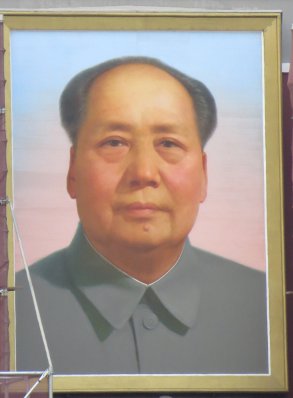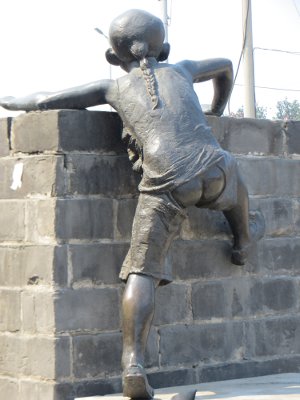Best of China
We explored a few areas within the extensive land of China in two different periods of time during the summer season. Traveling a total of 25 days, we visited the south between July 2 and July 9, 2013, and the north from August 30 to September 16, 2013. Our trip to the ancient civilization of China was just a scratch on the surface, as this country could easily take a lifetime to discover.
China is a multicultural country. The population is conformed of 56 ethnic groups, one big majority of Han Chinese and 55 minority groups, which in history have been “unified” within one nation through sequential processes of wars and expansionism played by different dynasties or political forces across centuries. Taking control over the land, their people, and even simplifying the language have been some of the strategies used to create a sense of unity between different ethnic groups. As an example, Mao Zedong, the most iconic symbol of the Communist Government in China, promoted from 1966 to 1976 a Cultural Revolution that followed his obsession to unify the country. Mao’s movement culminated with the disasters of his so called “Cultural Revolution”, which in reality was one of the darkest periods in Chinese history in which thousands of leaders and intellectuals were assassinated.

A lot has been said in the Western side of the world about the super powers of the growing economy of China. Our visit around the cities of Beijing and Shanghai, gave us a taste of this economic expansion as we could go anywhere using efficient subway systems, electric buses, and eco-friendly electric motorbikes, while contemplating on multiple impressive and modern buildings. But when we looked close in detail to the lives of ordinary citizen evolving in front of our eyes, we realized that the financial booming in China isn’t touching every household. The gap between those driving luxury cars around the city and those sleeping on the floor outside of a train station is huge. A very strange picture of Communism, far from what we thought true Communism entailed. Inequality in China is among the most extreme in the world, something perhaps unforgivable for a Communist government. Although the urban middle class is growing rapidly, approximately 70% of China’s population remains rural and poor. Accessing to education and health care isn’t free. The right to vote and protest appears to be none-existence or at least none practiced, most Chinese we asked about the status of these “rights” gave us inconclusive answers. Some people told us protesting is prohibited, but others said they could actually request a permit to protest. Some people told us they could vote for representatives in which they in place elect a president. But yet others said people cannot vote in China and they have never done it. We left the country with many unresolved questions about what is today called Communism in China and we are still wondering if any difference exists between their current form of government and a dictatorship. What we know for sure, is that the Communist Government of China strictly controls people’s access to information. World wide networks like Google, Facebook, Twitter, and YouTube are blocked to the public today. This is probably why all Chinese people we asked about Tibet, firmly believe Tibet is part of China and their government is just helping Tibetan people, as the goodness of the Dalai Lama is uncertain.

Traveling around China is definitely an unforgettable experience. We found ourselves always zigzagging huge crowds of people, many times surrounded by groups of Chinese tourists. We endured too many men smoking everywhere. We saw a lot of toddlers without diapers wearing only revealing pants, with open holes on the front and the back to facilitate the disposal of their excrement anywhere, anytime. We used public bathrooms without walls between squat toilets, where we have to witness strangers in undesirable circumstances and positions. Despite how many times our western sense of privacy and boundaries were tested, China was without a doubt an interesting country to explore. Any traveler should take the cultural shock that this country has to offer as an opportunity to realize that life doesn’t have to be lived in the way we know. From the beautiful rock formations of Huangshan Mountains to the peaceful nights of the ancient town of Hongcun, to the green tea plantations along the country side, to the giant army of the Terracotta Warriors, and the steep structure of the Great Wall, China has multiple historic and natural sites to visit and enjoy.
Below are other great things we enjoyed about China:
Food and Drinks
Pork Dumplings
Beef Stew
Mushroom in Tofu Curd
Pork with Bamboo Shoots
Huangshan Pijiu: local beer
Yam and Red Bean Dessert
Chinese BBQ: grilled vegetables, chicken, seafood all on a stick
Tsingtao Beer
Yanjing Beer
Chicken Gizzard, Beef Tendon, and Mushroom Hot Pot
Peking Duck: traditional roasted duck
Plum Juice
Lamb Soup with crumbled bread
Steamed Buns
Cold Noodles
Pita-type bread stuffed with beef (Chinese Pupusas or Arepas)
Pingyao Beef
Shui Jianbao: fried pan dumplings – Pingyao style
Pingyao Noodles with Tomato Sauce Dip

Favorite Sights and Activities
Sleeping on the Great Wall of China
Visiting the Huangshan Mountains
Spending the night in the Peaceful Village of Hongcun
Seeing the Size of the Terracotta Warriors
Strolling through the Muslim Quarters in Xian
People
Renchao and Huoying: Chinese students we met in Hongcun.
Spyros: from Greece, our CouchSurfing host in Shanghai.
Tan tan: from China, Spyros’ friend.
Eric: from China, Spyros’ friend.
Eugenia: from Ukraine, Spyros’ friend.
Shane: from China, our CouchSurfing host in Beijing.
Leo: from China, Shane’s roommate.
- Eva: from China, our CouchSurfing host in Xi’an.
Yang Jian Ke and Wang Tian: a Chinese restaurant owner and an employee that sparked a conversation and took pictures with us after giving us tea.
Hao: from China, met in Xi’an via CouchSurfing.
Markus: from Austria, met in Xi’an via CouchSurfing.
Miguel and Alejandra: from Spain, met at a hostel in Pingyao and traveled to the Great Wall together.
Nathan: from the USA, met at a hostel in Pingyao.
Hu: from China, our CouchSurfing host in Beijing.
Animals Viewed
Monkeys
Squirrels
Birds

Native Words
Cha = Tea
Nihao = Hello
Xiexie ni = Thank you
Pijiu = Beer
